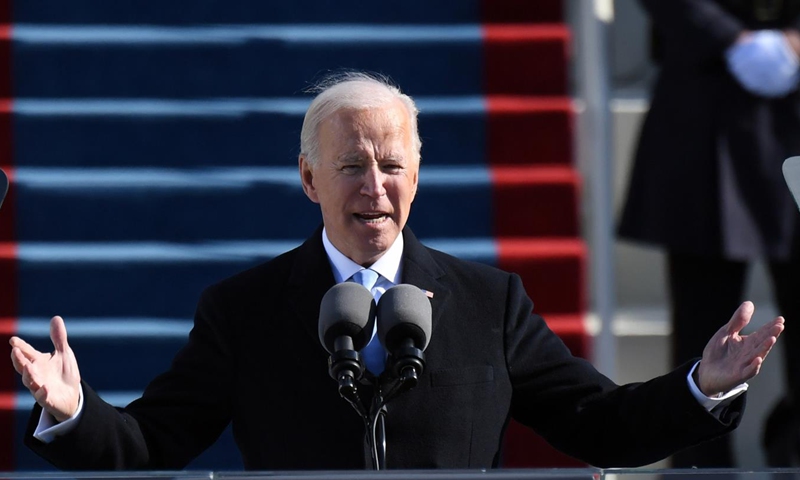Joe Biden's Buy American campaign unlikely to affect Chinese exports to US too much, economist says
Joe Biden’s Buy American campaign unlikely to affect Chinese exports to US too much, economist says

US President Joe Biden delivers his inauguration speech on Wednesday at the US Capitol in Washington, DC. Biden was sworn in as the 46th president of the US. He signed 17 executive orders, memorandums and proclamations hours after his inauguration. Photo: AFP
The new US president Joe Biden's initiative on boosting US manufacturing by strengthening the federal government's Buy American rules should be more effective than his predecessor's tariff-hiking policies, but it would have limited impact on Chinese exports to the US, considering made-in-China goods are competitive on price and availability, responded Chinese economist.
President Joe Biden signed an executive order on Monday with the goal of increasing the amount of made-in-US goods bought by the federal government as a way of boosting the country's manufacturing sector.
According to a speech he made on Monday, the new administration will appoint a designated director to oversee the government's Made in America initiative to ensure that agencies can't easily dodge the edict. For example, the government will publicly post all waivers that seek buying foreign parts instead of US-made ones.
Biden also noted that the government will increase requirements for buying locally-made parts for certain projects such as vehicles. That is to say, manufacturers have to use US-made parts at a higher proportion of the total vehicle, and they have to be the more valuable parts.
The ex-US president Donald Trump previously took a series of measures with the aim of bolstering US manufacturing, which Chinese economists said were broadly "unsuccessful."
"The Trump and Biden administrations had the same of goal of boosting local manufacturing but with different methods, with Biden tending to strengthen supervision on government purchasing of US goods, while Trump focusing on increasing tariffs on overseas imports. For the latter, companies found ways to seek loopholes such as shifting manufacturing bases in overseas markets. For the former, I think the effects would be more effective, because companies will seek to protect their reputation as the government will publicize waivers," Gao Lingyun, an expert from the Chinese Academy of Social Sciences in Beijing, told the Global Times.
However, Gao stressed that Biden's policies are unlikely to impose too much impact on China-US trade, particularly not during the pandemic.
"The US talent is focused on services and high-end manufacturing, not the mass production of medium-and low-end goods because of labor size, costs, etc. If the US government forces those production back to countries, it would be nothing more than a violation of economic principles," Gao said.
He also noted that the US production capabilities have been significant degraded during the pandemic, while their demands for medical and household products have surged. This means that they have to rely heavily on Chinese goods irrespective of White House policy. "But in the long run, how the China-US trade framework will evolve still depends on further negotiations," he said.
Global Times
